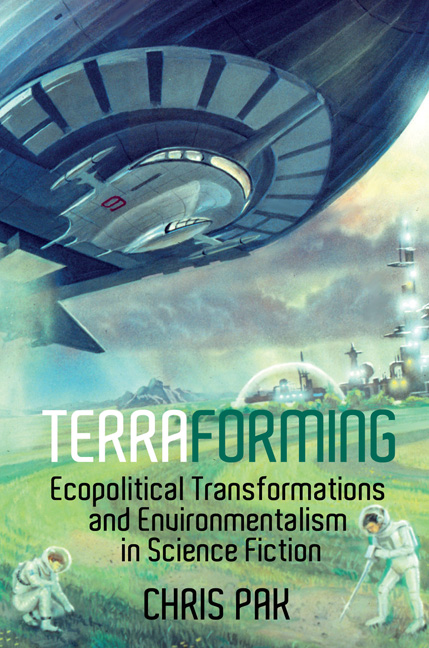Book contents
- Frontmatter
- Dedication
- Contents
- Acknowledgements
- Introduction: Terraforming: Engineering Imaginary Environments
- 1 Landscaping Nature's Otherness in Pre-1960s Terraforming and Proto-Gaian Stories
- 2 The American Pastoral and the Conquest of Space
- 3 Ecology and Environmental Awareness in 1960s–1970s Terraforming Stories
- 4 Edging Towards an Eco-cosmopolitan Vision
- 5 Kim Stanley Robinson's Mars Trilogy
- Conclusion
- Works Cited
- Index
5 - Kim Stanley Robinson's Mars Trilogy
- Frontmatter
- Dedication
- Contents
- Acknowledgements
- Introduction: Terraforming: Engineering Imaginary Environments
- 1 Landscaping Nature's Otherness in Pre-1960s Terraforming and Proto-Gaian Stories
- 2 The American Pastoral and the Conquest of Space
- 3 Ecology and Environmental Awareness in 1960s–1970s Terraforming Stories
- 4 Edging Towards an Eco-cosmopolitan Vision
- 5 Kim Stanley Robinson's Mars Trilogy
- Conclusion
- Works Cited
- Index
Summary
Kim Stanley Robinson's Science in the Capitol trilogy (2004; 2005; 2007) explores socio-political responses to climate change on Earth in a near-future setting, and features instances of geoengineering as a form of climate change mitigation. 2312 (2012) is set in a far-future solar system made habitable by a plethora of space habitats and terraformed planets, but it is with Robinson's groundbreaking Mars trilogy (1996c [1992]; 1996b [1993]; 1996a) that this study of terraforming ends. This trilogy engages in a dialogue over the cultural meaning of Mars, space exploration and terraforming. Its portrayal of Mars colonisation mirrors the structure of secessionist politics seen in such works as Ecotopia, which it uses to explore alternative socio-political arrangements. As Carol Franko explains, ‘fiction is for [Robinson] the crucial realm for the human activity of asserting and testing values’ (1997, 59). As in Ecotopia, the alternative practices experimented with in the new space of Mars begin to establish a feedback loop with the Earth of the text. One theme of the terraforming narrative is that of ‘throwing together,’ the combination of elements from many disciplines to establish the technical, social, political and economic basis for creating self-sustaining life-support systems on other planets.
The Mars trilogy incorporates overt environmental ethical reflection and brings this to bear against the industrial exploitation of Mars by multinationals that see it as a resource offering raw materials and a space for capitalist investment and development. Earth is forced to respond to the negative effects of climate change from a correspondingly global perspective, as the catastrophic effects of ecological disaster impact all the planet's population. The pastoral collectives that Bakhtin identifies are represented as nested collections of spaces, often associated with contesting positions that are developed throughout the narrative. The chronotope of the interplanetary mine in the Mars trilogy is connected to debates regarding the preservation of alien planets as wilderness areas, idylls where humanity's socio-political struggles have not yet reached. The growing politico-economic primacy of multinationals throughout the trilogy contrasts with the initial nationalist interest in terraforming: the colonists known as the First Hundred, although ethnically diverse, represent the joint – and paranoid – agendas of America and Russia.
- Type
- Chapter
- Information
- Publisher: Liverpool University PressPrint publication year: 2016



